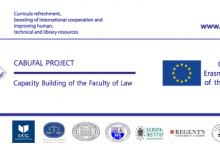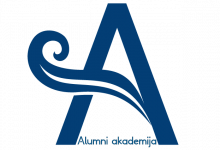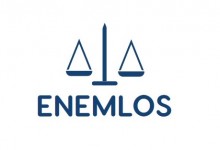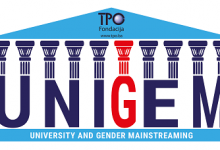Faculty of Law / LEGAL SCIENCES / ADMINISTRATIVE JUDICIAL PROCEDURE
| Course: | ADMINISTRATIVE JUDICIAL PROCEDURE/ |
| Course ID | Course status | Semester | ECTS credits | Lessons (Lessons+Exercises+Laboratory) |
| 5243 | Izborni | 1 | 4 | 2+0+0 |
| Programs | LEGAL SCIENCES |
| Prerequisites | |
| Aims | |
| Learning outcomes | |
| Lecturer / Teaching assistant | |
| Methodology |
| Plan and program of work | |
| Preparing week | Preparation and registration of the semester |
| I week lectures | |
| I week exercises | |
| II week lectures | |
| II week exercises | |
| III week lectures | |
| III week exercises | |
| IV week lectures | |
| IV week exercises | |
| V week lectures | |
| V week exercises | |
| VI week lectures | |
| VI week exercises | |
| VII week lectures | |
| VII week exercises | |
| VIII week lectures | |
| VIII week exercises | |
| IX week lectures | |
| IX week exercises | |
| X week lectures | |
| X week exercises | |
| XI week lectures | |
| XI week exercises | |
| XII week lectures | |
| XII week exercises | |
| XIII week lectures | |
| XIII week exercises | |
| XIV week lectures | |
| XIV week exercises | |
| XV week lectures | |
| XV week exercises |
| Student workload | |
| Per week | Per semester |
| 4 credits x 40/30=5 hours and 20 minuts
2 sat(a) theoretical classes 0 sat(a) practical classes 0 excercises 3 hour(s) i 20 minuts of independent work, including consultations |
Classes and final exam:
5 hour(s) i 20 minuts x 16 =85 hour(s) i 20 minuts Necessary preparation before the beginning of the semester (administration, registration, certification): 5 hour(s) i 20 minuts x 2 =10 hour(s) i 40 minuts Total workload for the subject: 4 x 30=120 hour(s) Additional work for exam preparation in the preparing exam period, including taking the remedial exam from 0 to 30 hours (remaining time from the first two items to the total load for the item) 24 hour(s) i 0 minuts Workload structure: 85 hour(s) i 20 minuts (cources), 10 hour(s) i 40 minuts (preparation), 24 hour(s) i 0 minuts (additional work) |
| Student obligations | |
| Consultations | |
| Literature | |
| Examination methods | |
| Special remarks | |
| Comment |
| Grade: | F | E | D | C | B | A |
| Number of points | less than 50 points | greater than or equal to 50 points and less than 60 points | greater than or equal to 60 points and less than 70 points | greater than or equal to 70 points and less than 80 points | greater than or equal to 80 points and less than 90 points | greater than or equal to 90 points |
Faculty of Law / LEGAL SCIENCES / VICTIMOLOGIE
| Course: | VICTIMOLOGIE/ |
| Course ID | Course status | Semester | ECTS credits | Lessons (Lessons+Exercises+Laboratory) |
| 5258 | Izborni | 1 | 4 | 2+0+0 |
| Programs | LEGAL SCIENCES |
| Prerequisites | |
| Aims | |
| Learning outcomes | |
| Lecturer / Teaching assistant | |
| Methodology |
| Plan and program of work | |
| Preparing week | Preparation and registration of the semester |
| I week lectures | |
| I week exercises | |
| II week lectures | |
| II week exercises | |
| III week lectures | |
| III week exercises | |
| IV week lectures | |
| IV week exercises | |
| V week lectures | |
| V week exercises | |
| VI week lectures | |
| VI week exercises | |
| VII week lectures | |
| VII week exercises | |
| VIII week lectures | |
| VIII week exercises | |
| IX week lectures | |
| IX week exercises | |
| X week lectures | |
| X week exercises | |
| XI week lectures | |
| XI week exercises | |
| XII week lectures | |
| XII week exercises | |
| XIII week lectures | |
| XIII week exercises | |
| XIV week lectures | |
| XIV week exercises | |
| XV week lectures | |
| XV week exercises |
| Student workload | |
| Per week | Per semester |
| 4 credits x 40/30=5 hours and 20 minuts
2 sat(a) theoretical classes 0 sat(a) practical classes 0 excercises 3 hour(s) i 20 minuts of independent work, including consultations |
Classes and final exam:
5 hour(s) i 20 minuts x 16 =85 hour(s) i 20 minuts Necessary preparation before the beginning of the semester (administration, registration, certification): 5 hour(s) i 20 minuts x 2 =10 hour(s) i 40 minuts Total workload for the subject: 4 x 30=120 hour(s) Additional work for exam preparation in the preparing exam period, including taking the remedial exam from 0 to 30 hours (remaining time from the first two items to the total load for the item) 24 hour(s) i 0 minuts Workload structure: 85 hour(s) i 20 minuts (cources), 10 hour(s) i 40 minuts (preparation), 24 hour(s) i 0 minuts (additional work) |
| Student obligations | |
| Consultations | |
| Literature | |
| Examination methods | |
| Special remarks | |
| Comment |
| Grade: | F | E | D | C | B | A |
| Number of points | less than 50 points | greater than or equal to 50 points and less than 60 points | greater than or equal to 60 points and less than 70 points | greater than or equal to 70 points and less than 80 points | greater than or equal to 80 points and less than 90 points | greater than or equal to 90 points |
Faculty of Law / LEGAL SCIENCES / INTERNATIONAL CRIMINAL LAW
| Course: | INTERNATIONAL CRIMINAL LAW/ |
| Course ID | Course status | Semester | ECTS credits | Lessons (Lessons+Exercises+Laboratory) |
| 5223 | Obavezan | 1 | 8 | 2+1+1 |
| Programs | LEGAL SCIENCES |
| Prerequisites | |
| Aims | |
| Learning outcomes | |
| Lecturer / Teaching assistant | |
| Methodology |
| Plan and program of work | |
| Preparing week | Preparation and registration of the semester |
| I week lectures | |
| I week exercises | |
| II week lectures | |
| II week exercises | |
| III week lectures | |
| III week exercises | |
| IV week lectures | |
| IV week exercises | |
| V week lectures | |
| V week exercises | |
| VI week lectures | |
| VI week exercises | |
| VII week lectures | |
| VII week exercises | |
| VIII week lectures | |
| VIII week exercises | |
| IX week lectures | |
| IX week exercises | |
| X week lectures | |
| X week exercises | |
| XI week lectures | |
| XI week exercises | |
| XII week lectures | |
| XII week exercises | |
| XIII week lectures | |
| XIII week exercises | |
| XIV week lectures | |
| XIV week exercises | |
| XV week lectures | |
| XV week exercises |
| Student workload | |
| Per week | Per semester |
| 8 credits x 40/30=10 hours and 40 minuts
2 sat(a) theoretical classes 1 sat(a) practical classes 1 excercises 6 hour(s) i 40 minuts of independent work, including consultations |
Classes and final exam:
10 hour(s) i 40 minuts x 16 =170 hour(s) i 40 minuts Necessary preparation before the beginning of the semester (administration, registration, certification): 10 hour(s) i 40 minuts x 2 =21 hour(s) i 20 minuts Total workload for the subject: 8 x 30=240 hour(s) Additional work for exam preparation in the preparing exam period, including taking the remedial exam from 0 to 30 hours (remaining time from the first two items to the total load for the item) 48 hour(s) i 0 minuts Workload structure: 170 hour(s) i 40 minuts (cources), 21 hour(s) i 20 minuts (preparation), 48 hour(s) i 0 minuts (additional work) |
| Student obligations | |
| Consultations | |
| Literature | |
| Examination methods | |
| Special remarks | |
| Comment |
| Grade: | F | E | D | C | B | A |
| Number of points | less than 50 points | greater than or equal to 50 points and less than 60 points | greater than or equal to 60 points and less than 70 points | greater than or equal to 70 points and less than 80 points | greater than or equal to 80 points and less than 90 points | greater than or equal to 90 points |
Faculty of Law / LEGAL SCIENCES / CRIMINOLOGY
| Course: | CRIMINOLOGY/ |
| Course ID | Course status | Semester | ECTS credits | Lessons (Lessons+Exercises+Laboratory) |
| 5253 | Obavezan | 1 | 8 | 2+1+1 |
| Programs | LEGAL SCIENCES |
| Prerequisites | There are no requirements for registering and listening to the subject |
| Aims | The subject aims to educate students in the field of CRIMINOLOGY science for the purpose of implementing scientific knowledge in practice. |
| Learning outcomes | After the student passes this exam he/she will be able to: define criminological disciplines and crime according to connotation and scope; annotate criminological etiology and phenomenology; analyze the factors of crime and criminality and forms of manifestation of crime; establish criteria for classification and typology of crime and prepare strategies against crime; organize criminological research of crimes and their perpetrators by using the method of studying crime as individual phenomena and methods of investigating crime in its totality; apply criminological knowledge in practice in order to effectively combat and prevent crime. |
| Lecturer / Teaching assistant | Prof. dr Velimir Rakočević |
| Methodology | Lectures, exercises, seminar papers, consultations |
| Plan and program of work | |
| Preparing week | Preparation and registration of the semester |
| I week lectures | The concept of criminology, the subject of criminology, the relationship between criminology and other scientific disciplines, |
| I week exercises | |
| II week lectures | Methods of criminology (study of individual cases of criminal behavior, clinical method, anamnestic method, documentation and content analysis, techniques used in the study of criminal behavior as individual phenomena, |
| II week exercises | |
| III week lectures | Methods and techniques of learning about criminality as a mass social phenomenon, stages of criminological research, collection of facts |
| III week exercises | |
| IV week lectures | Application of statistics in criminology (method of correlation, statistical records of crime, techniques of collecting data on real crime, statistical analysis of obtained data) |
| IV week exercises | |
| V week lectures | Methods of crime forecasting |
| V week exercises | |
| VI week lectures | Criminological heritage |
| VI week exercises | |
| VII week lectures | The beginning of the formation of criminology as a science |
| VII week exercises | |
| VIII week lectures | Classical orientation in criminology, Contemporary neoclassicism, Right-wing realism |
| VIII week exercises | |
| IX week lectures | Positivist orientation in criminology, cartographic school, anthropological school, biological understandings, psychological understandings, |
| IX week exercises | |
| X week lectures | Ecological theory, Theory of learning, Theory of cultural conflict and gap, Theories of social pressure, Control theories, recent sociological theories |
| X week exercises | |
| XI week lectures | Phenomenological dimension of the criminal phenomenon, scope, dynamics and structure of criminality, structure of criminality according to gender, regional characteristics of criminality, seasonal and temporal variations of criminality. |
| XI week exercises | |
| XII week lectures | Typologies of crime, |
| XII week exercises | |
| XIII week lectures | Classic crime |
| XIII week exercises | |
| XIV week lectures | New forms of crime: organized crime, money laundering, cybercrime, environmental crime, etc. |
| XIV week exercises | |
| XV week lectures | Endogenous and exogenous factors of crime |
| XV week exercises |
| Student workload | Classes and final exam: (10 hours 40 minutes) x 16 = 170 hours 40 minutes Necessary preparations (administration, registration, certification before the beginning of the semester): 2x (10 hours and 40 minutes) = 21 hours and 20 minutes Total workload for the course: 8x30 = 240 hours |
| Per week | Per semester |
| 8 credits x 40/30=10 hours and 40 minuts
2 sat(a) theoretical classes 1 sat(a) practical classes 1 excercises 6 hour(s) i 40 minuts of independent work, including consultations |
Classes and final exam:
10 hour(s) i 40 minuts x 16 =170 hour(s) i 40 minuts Necessary preparation before the beginning of the semester (administration, registration, certification): 10 hour(s) i 40 minuts x 2 =21 hour(s) i 20 minuts Total workload for the subject: 8 x 30=240 hour(s) Additional work for exam preparation in the preparing exam period, including taking the remedial exam from 0 to 30 hours (remaining time from the first two items to the total load for the item) 48 hour(s) i 0 minuts Workload structure: 170 hour(s) i 40 minuts (cources), 21 hour(s) i 20 minuts (preparation), 48 hour(s) i 0 minuts (additional work) |
| Student obligations | Colloquium up to 40 points Activities during the semester up to 10 points Final exam up to 50 points |
| Consultations | |
| Literature | Rakočević V. (2007). Criminology, Podgorica |
| Examination methods | |
| Special remarks | |
| Comment |
| Grade: | F | E | D | C | B | A |
| Number of points | less than 50 points | greater than or equal to 50 points and less than 60 points | greater than or equal to 60 points and less than 70 points | greater than or equal to 70 points and less than 80 points | greater than or equal to 80 points and less than 90 points | greater than or equal to 90 points |
Faculty of Law / LEGAL SCIENCES / CRIMINAL-LEGAL CLINICS
| Course: | CRIMINAL-LEGAL CLINICS/ |
| Course ID | Course status | Semester | ECTS credits | Lessons (Lessons+Exercises+Laboratory) |
| 5254 | Obavezan | 1 | 10 | 3+2+0 |
| Programs | LEGAL SCIENCES |
| Prerequisites | |
| Aims | |
| Learning outcomes | After the student passes this exam he/she will be able to: define and describe certain concepts and notions of general and special parts of criminal law; differentiate concepts and institutes of general and special parts of criminal law and their interconnection; implementat certain institutes of the general part of criminal law in a concrete factual description of an event; analyse the factual description of an events from which a criminal matter originates and determine the existence of elements of the specific crime; determine the existence of conditions for application and other important criminal law institutes on a specific case from practice which is of great importance for the proper application of the criminal standard. |
| Lecturer / Teaching assistant | |
| Methodology |
| Plan and program of work | |
| Preparing week | Preparation and registration of the semester |
| I week lectures | |
| I week exercises | |
| II week lectures | |
| II week exercises | |
| III week lectures | |
| III week exercises | |
| IV week lectures | |
| IV week exercises | |
| V week lectures | |
| V week exercises | |
| VI week lectures | |
| VI week exercises | |
| VII week lectures | |
| VII week exercises | |
| VIII week lectures | |
| VIII week exercises | |
| IX week lectures | |
| IX week exercises | |
| X week lectures | |
| X week exercises | |
| XI week lectures | |
| XI week exercises | |
| XII week lectures | |
| XII week exercises | |
| XIII week lectures | |
| XIII week exercises | |
| XIV week lectures | |
| XIV week exercises | |
| XV week lectures | |
| XV week exercises |
| Student workload | |
| Per week | Per semester |
| 10 credits x 40/30=13 hours and 20 minuts
3 sat(a) theoretical classes 0 sat(a) practical classes 2 excercises 8 hour(s) i 20 minuts of independent work, including consultations |
Classes and final exam:
13 hour(s) i 20 minuts x 16 =213 hour(s) i 20 minuts Necessary preparation before the beginning of the semester (administration, registration, certification): 13 hour(s) i 20 minuts x 2 =26 hour(s) i 40 minuts Total workload for the subject: 10 x 30=300 hour(s) Additional work for exam preparation in the preparing exam period, including taking the remedial exam from 0 to 30 hours (remaining time from the first two items to the total load for the item) 60 hour(s) i 0 minuts Workload structure: 213 hour(s) i 20 minuts (cources), 26 hour(s) i 40 minuts (preparation), 60 hour(s) i 0 minuts (additional work) |
| Student obligations | |
| Consultations | |
| Literature | |
| Examination methods | |
| Special remarks | |
| Comment |
| Grade: | F | E | D | C | B | A |
| Number of points | less than 50 points | greater than or equal to 50 points and less than 60 points | greater than or equal to 60 points and less than 70 points | greater than or equal to 70 points and less than 80 points | greater than or equal to 80 points and less than 90 points | greater than or equal to 90 points |
Faculty of Law / LEGAL SCIENCES / INTERNATIONAL ENVIRONMENTAL LAW
| Course: | INTERNATIONAL ENVIRONMENTAL LAW/ |
| Course ID | Course status | Semester | ECTS credits | Lessons (Lessons+Exercises+Laboratory) |
| 5225 | Izborni | 2 | 4 | 2++0 |
| Programs | LEGAL SCIENCES |
| Prerequisites | / |
| Aims | Introducing students to basic concepts and the importance of environmental protection. |
| Learning outcomes | After the student passes this exam, he will be able to: recognize, differentiate and explain the relationships regulated by the International Environmental Protection Law ; analyzes the basic international sources of law; distinguish between international courts and other bodies before which these rights are protected; recognize and use procedures available in national law. |
| Lecturer / Teaching assistant | Prof. dr Maja Kostić-Mandić |
| Methodology | Lectures, practical forms of teaching (case studies, student presentations, discussions, simulations, writing legal opinions), consultations. |
| Plan and program of work | |
| Preparing week | Preparation and registration of the semester |
| I week lectures | Introductory notes on the subject and literature, ecology and the environment, the importance of studying international environmental protection |
| I week exercises | |
| II week lectures | Global environmental problems (climate change, ozone depletion, loss of biodiversity, water and land pollution, forest degradation, waste management, GMOs, major incidents, chemical risk and radiation hazard) |
| II week exercises | |
| III week lectures | International treaties as sources of law |
| III week exercises | |
| IV week lectures | Practice of the International Court of Justice (case studies) |
| IV week exercises | |
| V week lectures | Human rights and environmental protection; practice of the European Court of Human Rights (case studies) |
| V week exercises | |
| VI week lectures | Basic principles on which environmental protection is based (principle of prevention, principle of polluter pays, principle of coordination and cooperation) (case studies) |
| VI week exercises | |
| VII week lectures | Colloquium |
| VII week exercises | |
| VIII week lectures | European Environmental Protection Law |
| VIII week exercises | |
| IX week lectures | Colloquium |
| IX week exercises | |
| X week lectures | Availability and access to information, the possibility of public participation in environmental decision-making and legal protection of these rights |
| X week exercises | |
| XI week lectures | Environmental impact assessment and Strategic environmental impact assessment |
| XI week exercises | |
| XII week lectures | Transboundary pollution |
| XII week exercises | |
| XIII week lectures | Remedies available before the national courts (case studies) |
| XIII week exercises | |
| XIV week lectures | Trial simulation (hypothetical case of building a facility on a lake located in three countries) |
| XIV week exercises | |
| XV week lectures | Writing a legal opinion on a given topic |
| XV week exercises |
| Student workload | |
| Per week | Per semester |
| 4 credits x 40/30=5 hours and 20 minuts
2 sat(a) theoretical classes 0 sat(a) practical classes 0 excercises 3 hour(s) i 20 minuts of independent work, including consultations |
Classes and final exam:
5 hour(s) i 20 minuts x 16 =85 hour(s) i 20 minuts Necessary preparation before the beginning of the semester (administration, registration, certification): 5 hour(s) i 20 minuts x 2 =10 hour(s) i 40 minuts Total workload for the subject: 4 x 30=120 hour(s) Additional work for exam preparation in the preparing exam period, including taking the remedial exam from 0 to 30 hours (remaining time from the first two items to the total load for the item) 24 hour(s) i 0 minuts Workload structure: 85 hour(s) i 20 minuts (cources), 10 hour(s) i 40 minuts (preparation), 24 hour(s) i 0 minuts (additional work) |
| Student obligations | Attendance and active participation in practical classes |
| Consultations | Mondays 11 a.m. - 13 p.m. |
| Literature | M. Kostić-Mandić, International Environmental Law, Hrestomatija, Faculty of Law, Podgorica, 2024. General literature (available in the Faculty of Law Library) |
| Examination methods | Forms of knowledge assessment are colloquium, final exam and remedial exam (in oral form) and exam in August. The following are evaluated: - Colloquium - up to 30 points - Participation in practical classes - up to 40 points - Final exam - up to 30 points - A passing grade is obtained if at least 50 points are accumulated cumulatively Grade A B C D E No. of points 90-100 80-89 70-79 60-69 50-59 |
| Special remarks | / |
| Comment | / |
| Grade: | F | E | D | C | B | A |
| Number of points | less than 50 points | greater than or equal to 50 points and less than 60 points | greater than or equal to 60 points and less than 70 points | greater than or equal to 70 points and less than 80 points | greater than or equal to 80 points and less than 90 points | greater than or equal to 90 points |
Faculty of Law / LEGAL SCIENCES / JUVENILE CRIMINAL LAW
| Course: | JUVENILE CRIMINAL LAW/ |
| Course ID | Course status | Semester | ECTS credits | Lessons (Lessons+Exercises+Laboratory) |
| 5261 | Izborni | 2 | 4 | 2+0+0 |
| Programs | LEGAL SCIENCES |
| Prerequisites | |
| Aims | |
| Learning outcomes | |
| Lecturer / Teaching assistant | |
| Methodology |
| Plan and program of work | |
| Preparing week | Preparation and registration of the semester |
| I week lectures | |
| I week exercises | |
| II week lectures | |
| II week exercises | |
| III week lectures | |
| III week exercises | |
| IV week lectures | |
| IV week exercises | |
| V week lectures | |
| V week exercises | |
| VI week lectures | |
| VI week exercises | |
| VII week lectures | |
| VII week exercises | |
| VIII week lectures | |
| VIII week exercises | |
| IX week lectures | |
| IX week exercises | |
| X week lectures | |
| X week exercises | |
| XI week lectures | |
| XI week exercises | |
| XII week lectures | |
| XII week exercises | |
| XIII week lectures | |
| XIII week exercises | |
| XIV week lectures | |
| XIV week exercises | |
| XV week lectures | |
| XV week exercises |
| Student workload | |
| Per week | Per semester |
| 4 credits x 40/30=5 hours and 20 minuts
2 sat(a) theoretical classes 0 sat(a) practical classes 0 excercises 3 hour(s) i 20 minuts of independent work, including consultations |
Classes and final exam:
5 hour(s) i 20 minuts x 16 =85 hour(s) i 20 minuts Necessary preparation before the beginning of the semester (administration, registration, certification): 5 hour(s) i 20 minuts x 2 =10 hour(s) i 40 minuts Total workload for the subject: 4 x 30=120 hour(s) Additional work for exam preparation in the preparing exam period, including taking the remedial exam from 0 to 30 hours (remaining time from the first two items to the total load for the item) 24 hour(s) i 0 minuts Workload structure: 85 hour(s) i 20 minuts (cources), 10 hour(s) i 40 minuts (preparation), 24 hour(s) i 0 minuts (additional work) |
| Student obligations | |
| Consultations | |
| Literature | |
| Examination methods | |
| Special remarks | |
| Comment |
| Grade: | F | E | D | C | B | A |
| Number of points | less than 50 points | greater than or equal to 50 points and less than 60 points | greater than or equal to 60 points and less than 70 points | greater than or equal to 70 points and less than 80 points | greater than or equal to 80 points and less than 90 points | greater than or equal to 90 points |
Faculty of Law / LEGAL SCIENCES / PENOLOGY
| Course: | PENOLOGY/ |
| Course ID | Course status | Semester | ECTS credits | Lessons (Lessons+Exercises+Laboratory) |
| 5255 | Obavezan | 2 | 8 | 2+1+1 |
| Programs | LEGAL SCIENCES |
| Prerequisites | No conditions |
| Aims | Acquaintance of students with the system of execution of criminal sanctions in Montenegro and EU countries, forms of treatment in penal institutions and other issues of importance for the execution of criminal sanctions |
| Learning outcomes | After passing this exam, the student will be able to: - defines and explains the system, individual institutes and concepts of the right to enforce criminal sanctions in Montenegro; - recognizes and interprets the norms that regulate the institutes of criminal enforcement law so that he can connect them, if necessary, with the norms that regulate the area of criminal substantive and criminal procedural law; - analyzes the criminal sanctions system of Montenegro, highlights its advantages and disadvantages and compares it with the criminal sanctions systems of the EU countries; - compare different prison execution systems and conclude how important penitentiary individualization is for success in achieving the purpose of punishment; - gives arguments in support of the improvement of the system of criminal sanctions and criminal law measures that would be an alternative to prison sentences, i.e. the classic system of execution of the sentence of deprivation of liberty, and in this direction analyzes the most important criminal sanctions of an alternative nature from comparative (EU) law. |
| Lecturer / Teaching assistant | Darko Radulovic, Ph.D. Associate Professor |
| Methodology | Lectures, exercises, seminar papers, consultations and practical teaching |
| Plan and program of work | |
| Preparing week | Preparation and registration of the semester |
| I week lectures | Introductory consultation classes for the purpose of familiarization with teaching literature and work methodology |
| I week exercises | |
| II week lectures | The concept and subject of penology, the historical development of criminal enforcement law |
| II week exercises | |
| III week lectures | Penological methods, the relationship between penology and other sciences, international documents in the field of the law of enforcement of criminal sanctions |
| III week exercises | |
| IV week lectures | Sources of criminal enforcement law, concept and elements of punishment |
| IV week exercises | |
| V week lectures | Theories about the legal basis and purpose of punishment |
| V week exercises | |
| VI week lectures | The concept, goals and standards of restorative justice in penology, factors of the appearance of imprisonment, plurality and unification of imprisonment |
| VI week exercises | |
| VII week lectures | Imprisonment enforcement systems |
| VII week exercises | |
| VIII week lectures | Colloquium |
| VIII week exercises | |
| IX week lectures | Penitentiary individualization, resocialization as the primary purpose of serving a prison sentence |
| IX week exercises | |
| X week lectures | Study of the personality of the convicted person (scientific and empirical), concept and types of classification of convicted persons |
| X week exercises | |
| XI week lectures | Concept and types of treatment of convicted persons, categorization of penal institutions |
| XI week exercises | |
| XII week lectures | Alternative models of behavior and alternatives to punishment |
| XII week exercises | |
| XIII week lectures | Alternative criminal sanctions and criminal law measures in the legislation of Montenegro |
| XIII week exercises | |
| XIV week lectures | Criminal sanctions for minors and their execution according to the Act on treatment of minors in criminal proceedings |
| XIV week exercises | |
| XV week lectures | International documents in the field of execution of criminal sanctions for minors |
| XV week exercises |
| Student workload | Weekly 8 credits x 40/30 = 10 hours and 40 minutes Structure: 2 hours of lectures 2 hours of exercises 6 hours and 40 minutes of individual student work (preparation for laboratory exercises, colloquiums, homework) including consultations In the semester Classes and final exam: (10 hours and 40 minutes) x 16 = 170 hours and 40 minutes Necessary preparation before the beginning of the semester (administration, registration, certification): 2 x (10 hours and 40 minutes) = 21 hours and 20 minutes Total workload for the course: 8 x 30 = 240 hours Additional work for exam preparation in the make-up exam period, including taking the make-up exam from 0 - 30 hours. Load structure: 170 hours and 40 minutes (teaching) + 21 hours and 20 minutes (preparation) + 30 hours (additional work) |
| Per week | Per semester |
| 8 credits x 40/30=10 hours and 40 minuts
2 sat(a) theoretical classes 1 sat(a) practical classes 1 excercises 6 hour(s) i 40 minuts of independent work, including consultations |
Classes and final exam:
10 hour(s) i 40 minuts x 16 =170 hour(s) i 40 minuts Necessary preparation before the beginning of the semester (administration, registration, certification): 10 hour(s) i 40 minuts x 2 =21 hour(s) i 20 minuts Total workload for the subject: 8 x 30=240 hour(s) Additional work for exam preparation in the preparing exam period, including taking the remedial exam from 0 to 30 hours (remaining time from the first two items to the total load for the item) 48 hour(s) i 0 minuts Workload structure: 170 hour(s) i 40 minuts (cources), 21 hour(s) i 20 minuts (preparation), 48 hour(s) i 0 minuts (additional work) |
| Student obligations | Students are required to attend classes, participate in exercises, take the colloquium and the final exam |
| Consultations | Once a week at the appropriate time |
| Literature | Slobodanka Konstatinović-Vilić, Miomira Kostić-Penologija, Niš, 2006.g. Đorđe Ignjatović-Pravo izvršenja krivičnih sankcija,Beograd,2010.g. Milan Milutinović, Penologija, Beograd, 1992.g. Zakon o izvršenju kazni zatvora,novčane kazne i mjera bezbjednosti,Službeni list CG, br.36/15 Zakon o postupanju prema maloljetnicima u krivičnom postupku,Službeni list Crne Gore,br.64/11 Zakon o izvršenju uslovne osude i kazne rada u javnom interesu, Službeni list Crne Gore, br.32/2014 i 17/2019 |
| Examination methods | Colloquium 45 points Final exam 50 points Seminar paper 5 points A student receives a passing grade when he cumulatively collects a certain number of points in the following ranges on the colloquium and final exam: grade E (50-59), grade D (60-69), grade C (70-79), grade B (80-89). , grade A (90-100). The colloquium, remedial colloquium, final exam and remedial final exam are taken in the form of a written test. |
| Special remarks | Part of the teaching activities will be carried out through visits to the Administration for the Execution of Criminal Sanctions of Montenegro and other entities responsible for the implementation and supervision of the execution of certain criminal sanctions in Montenegro. |
| Comment | - |
| Grade: | F | E | D | C | B | A |
| Number of points | less than 50 points | greater than or equal to 50 points and less than 60 points | greater than or equal to 60 points and less than 70 points | greater than or equal to 70 points and less than 80 points | greater than or equal to 80 points and less than 90 points | greater than or equal to 90 points |
Faculty of Law / LEGAL SCIENCES / CRIMINALISTICS
| Course: | CRIMINALISTICS/ |
| Course ID | Course status | Semester | ECTS credits | Lessons (Lessons+Exercises+Laboratory) |
| 5256 | Obavezan | 2 | 8 | 2+1+1 |
| Programs | LEGAL SCIENCES |
| Prerequisites | |
| Aims | |
| Learning outcomes | After the student passes this exam he/she will be able to: provide basic content of criminalistic tactics, methods, techniques, operations, strategies, analytics and the like. define the criminal investigation of criminal offenses and perpetrators; connect the basic questions of criminalistics, methodology with indications, criminal rules for setting up and checking versions and new possibilities of planning criminal activities; organize crime control and develop a criminal investigation; determine strategies for opposing crime; apply criminal methods and techniques in the process of detecting and resolving of criminal offenses. |
| Lecturer / Teaching assistant | |
| Methodology |
| Plan and program of work | |
| Preparing week | Preparation and registration of the semester |
| I week lectures | |
| I week exercises | |
| II week lectures | |
| II week exercises | |
| III week lectures | |
| III week exercises | |
| IV week lectures | |
| IV week exercises | |
| V week lectures | |
| V week exercises | |
| VI week lectures | |
| VI week exercises | |
| VII week lectures | |
| VII week exercises | |
| VIII week lectures | |
| VIII week exercises | |
| IX week lectures | |
| IX week exercises | |
| X week lectures | |
| X week exercises | |
| XI week lectures | |
| XI week exercises | |
| XII week lectures | |
| XII week exercises | |
| XIII week lectures | |
| XIII week exercises | |
| XIV week lectures | |
| XIV week exercises | |
| XV week lectures | |
| XV week exercises |
| Student workload | |
| Per week | Per semester |
| 8 credits x 40/30=10 hours and 40 minuts
2 sat(a) theoretical classes 1 sat(a) practical classes 1 excercises 6 hour(s) i 40 minuts of independent work, including consultations |
Classes and final exam:
10 hour(s) i 40 minuts x 16 =170 hour(s) i 40 minuts Necessary preparation before the beginning of the semester (administration, registration, certification): 10 hour(s) i 40 minuts x 2 =21 hour(s) i 20 minuts Total workload for the subject: 8 x 30=240 hour(s) Additional work for exam preparation in the preparing exam period, including taking the remedial exam from 0 to 30 hours (remaining time from the first two items to the total load for the item) 48 hour(s) i 0 minuts Workload structure: 170 hour(s) i 40 minuts (cources), 21 hour(s) i 20 minuts (preparation), 48 hour(s) i 0 minuts (additional work) |
| Student obligations | |
| Consultations | |
| Literature | |
| Examination methods | |
| Special remarks | |
| Comment |
| Grade: | F | E | D | C | B | A |
| Number of points | less than 50 points | greater than or equal to 50 points and less than 60 points | greater than or equal to 60 points and less than 70 points | greater than or equal to 70 points and less than 80 points | greater than or equal to 80 points and less than 90 points | greater than or equal to 90 points |











